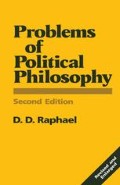Abstract
In the modern world we speak of’ sovereign States’. Not all states are sovereign States. Those that are constituent members of a federal commonwealth or union do not possess sovereignty, since they are subject, except in certain limited fields of action, to the sovereignty of the federal State or union. The sovereignty which is attributed to States that are not constituent members of a federal sovereign State, is particularly important in regard to international relations. State sovereignty has not always been a feature of international society in the past, and it may not always be so in the future. For three or four centuries, however, State sovereignty has been an essential factor of politics, and that position is likely to remain for some time to come. It is therefore of some importance to be clear what the concept means and what it does not mean.
Preview
Unable to display preview. Download preview PDF.
Copyright information
© 1990 D. D. Raphael
About this chapter
Cite this chapter
Raphael, D.D. (1990). Sovereignty, Power, and Authority. In: Problems of Political Philosophy. Palgrave, London. https://doi.org/10.1007/978-1-349-20996-5_6
Download citation
DOI: https://doi.org/10.1007/978-1-349-20996-5_6
Publisher Name: Palgrave, London
Print ISBN: 978-0-333-49859-0
Online ISBN: 978-1-349-20996-5
eBook Packages: Palgrave Political & Intern. Studies CollectionPolitical Science and International Studies (R0)

